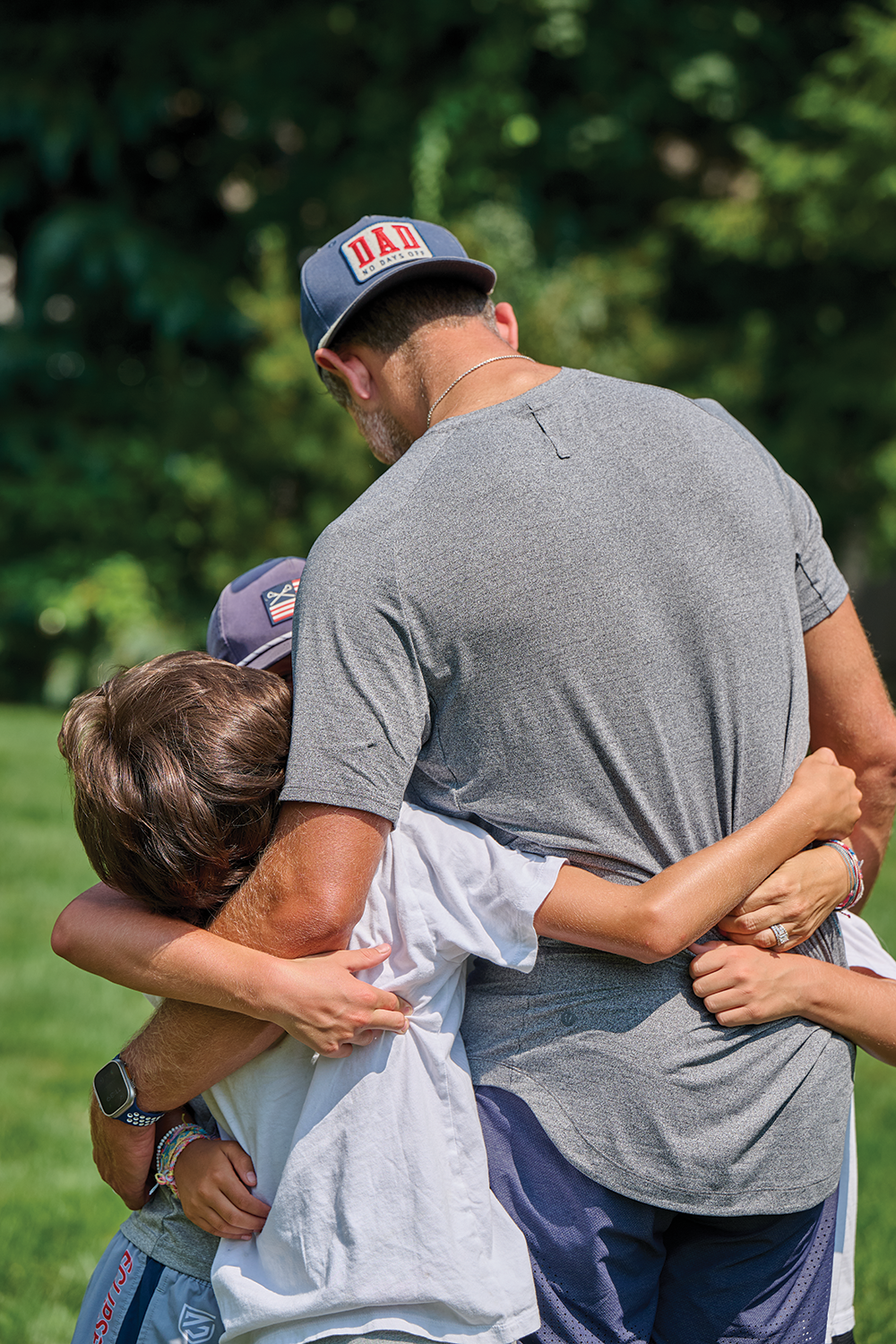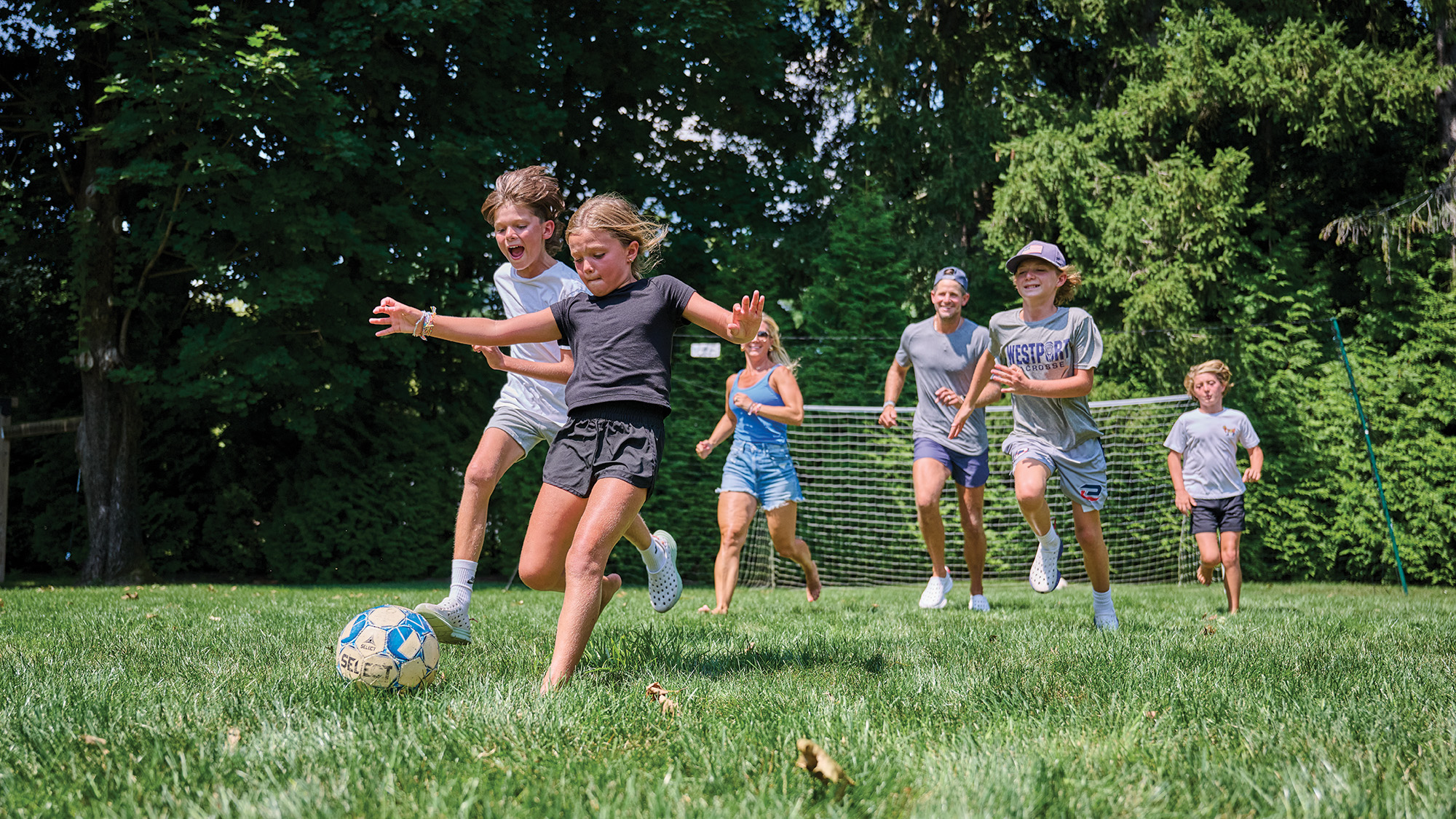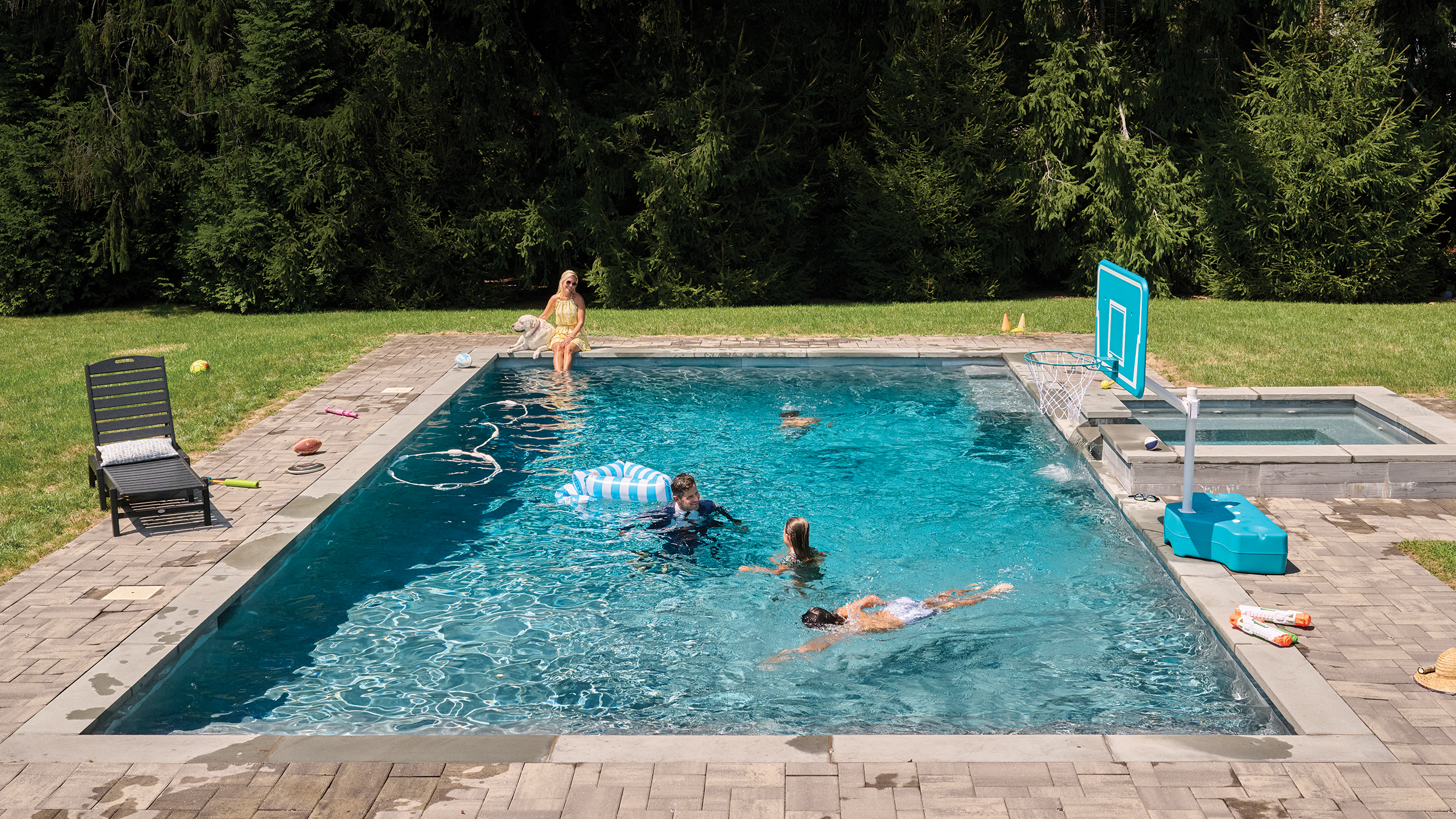Dan Orlovsky Is All In
Dan Orlovsky needs a first down on every play — at work, yes, but especially at home.
By Pete Croatto
Photos by Peter Morenus
The cafeteria at the ESPN campus in Bristol, Connecticut, is a monument to distraction. I'm confronted by three preposterous flat-screen TVs on the far wall. Look up. A parade of smaller screens offers a high-definition plea not to engage with your lunch companion.
Into this boulevard of broken attention spans enters Dan Orlovsky '17 (BGS), ESPN's NFL analyst, 20 years removed from a storied career as the UConn quarterback who propelled the football program into national prominence. He absolutely looks the part, dressed in a slim-fit suit that straddles the line between blueberry and robin's egg. There's no tie but a sharp blue-gridded white dress shirt and stylish salt-and-pepper stubble. His hair is perfect.
Aside from developing a reputation as a great football analyst, Orlovsky has become known for his pile of oddities, which he embraces. ("I told you I'm weird," he reminds me during our conversation.) Food is a big one. Today, he arrives with what looks like a chicken avocado salad. But because there is no lettuce present, his lunch resembles an entree from the apocalypse, a hillock of (seasoned?) browns and beiges specked with green. There was his memorable admission on Twitter that he uses a bath towel around 30 times before it's removed from the rotation — presumably with tongs into a hazmat bag.
At work, Orlovsky has a "maniacal desire to be the best," says Laura Rutledge, the host of "NFL Live," his main gig. "He preps like no one I've ever seen in my entire life for anything that he does."
Orlovsky, 41, does not do these things to perpetuate an image. Everything has a reason, even the bizarro food choices. Why introduce something new and possibly disruptive? Then he can't spend time with his family or do his job. That's not how to win the day. When you help resurrect a college football program and get drafted by a National Football League team, that credo isn't ridiculous. It's required. Lack the drive to excel while reducing the game's din and violence to its necessities and you'll be prowling LinkedIn by your 25th birthday. Orlovsky spent 12 years in the NFL; the average career lasts a hair over three.
Why, he wonders, can't the principles that made him a millionaire in the NFL work away from the football field?
Every day Dan Orlovsky tries to answer that question.


Quarterback is the glamour position in American sports. At UConn, Orlovsky was Tom Brady. He remains the school's all-time leader in passing yards, touchdowns, attempts, and completions. Orlovsky led the Huskies to their first bowl win. His NFL career was spent as a backup quarterback who managed to start some games and win a few. That makes him a smashing success in the metrics measured outside of sports bars and fans' unforgiving memories.
That he now has this kind of job — a continuation of his past life — is a most fortunate development. Orlovsky left pro football in 2017 after the Los Angeles Rams released him before the season started. He did not have enough money or patience to stay retired. He took a meeting about a sales job in the medical field. It got serious. "I'm not trying to tell you what to do," his wife, Tiffany, said after she stopped laughing, "but what are you doing?" She saw Dan's gift: how he simplified the complexities on a football field. He started posting his insights on Twitter. That eventually led to ESPN, the home of "SportsCenter" and Stephen A. Smith's boiling lava takes and "Monday Night Football." Now friends joke they can't turn on the TV without seeing him. Tiffany, an Eagles fan, thought it was cool when he did quick hits on Comcast Philadelphia.
He went from one cultural behemoth, the NFL, to another. Even in a continuously fragmented world of entertainment options, ESPN is universally recognized as the place for sports. Good enough isn't good enough in the battle to get better, to exceed your limits, to win the day. As a kid, Orlovsky, who grew up in Shelton, Connecticut, watched "SportsCenter" all the time. Dan and Keith, Rich and Stu — those were his boys. "He always lives in a world of being grateful for what he's doing," Rutledge says. "He never wants to let down that opportunity by not being prepared enough."


There's no game tape for parenting... Each child is so different, and parenthood has no end zone.
The NFL season is a cram session from Sunday to Friday. After spending hours watching games Sunday and recording his observations, Orlovsky is up before 4 a.m. — he claims to have never hit a snooze button. In his shuttling between ESPN studios in New York City and Bristol during the NFL season to appear on "Get Up," "First Take," and "NFL Live," he'll watch more games. The film sessions continue Tuesday and Wednesday. Then there's "Thursday Night Football." Exhausted yet?
"I cannot talk about a player or a game on TV if I have not watched it," Orlovsky says. "So, if that means I've got to get up at three and watch it, or I've got to go to bed at midnight and watch it, I have to."
Rutledge says that Orlovsky produces from his position. It's not unusual for Mark Eiseman, a producer on "NFL Live," to open a text from Orlovsky with 30 video clips that are worth exploring for the shows that week. Ideas will come in at 6 a.m. During commercial breaks, Orlovsky might watch more game footage on his phone or chat with his colleagues about the next topic. "The energy is contagious," says Eiseman, and contributes to the cast's camaraderie. "He's a glue to a lot of that," the producer adds. Rutledge, one of the show's two female regulars, along with Sports Emmy"“nominated analyst Mina Kimes, says the comfort she feels on set comes from the analysts' support. That includes Orlovsky, who embraces Rutledge's and Kimes' insights.
What struck Rutledge when she first worked with Orlovsky was his willingness to make the people around him better. "I do think a big reason for his success," she says, "is he shines on his own, but he makes others shine, too." In a time when an analyst must entertain and educate, "nobody can hang better than Dan," Eiseman says. "He will be the one making the joke, and he can take the joke."
Orlovsky wants to be the best at this. How close is he? "I don't think there's anybody on the planet who can do what I do."


There is a family waiting, the members so wholesome-looking and camera-ready they belong in the photo that comes with the frame. With them, there are no stats, no proof that he was right — man, he loves being right — that will be dissected on the sports blogs and social media. There's no contract clause Dan Orlovsky can meet.
At home, he goes all in. Wanna shoot hoops, Dad? Sure! He packs notes — sometimes it's a Bible verse — with the kids' lunches every day. The boys — Noah, Madden, and Hunter — are 12. Aren't they a little old for that? "Don't care," Orlovsky says. He saves everything the kids commit to paper, including the 300 comic books Madden has drawn. They're in giant boxes in the basement. He gives the kids interview questions at dinner, a trick he stole from rapper, entrepreneur, and fellow father of four Jesse Itzler. One was, "What does success look like to you?" Lennon, their 8-year-old daughter, wants to live with Mom and Dad and play for the U.S. women's World Cup team. Orlovsky saved that piece of paper, too.
It's the only way he knows — full force, ready for contact, embrace the chaos. He loves pain. It is a feature of his workouts. Without it, what's the point? He is probably the only man in America who wishes he fought more with his wife. Every NFL offseason, Orlovsky would come home and take over like Patrick Mahomes with two minutes left in the fourth quarter. "Enough! I know what I'm doing," Tiffany would say, exasperated. Eventually, they laughed about it; Dan stepped back. He cannot be a perfect father, but he has to try. Otherwise, he won't get better. Six summers remain, maybe, before his kids would rather drink poison than hang with Dad. Yesterday was a mess. He finished work and picked up the kids, who had been watching the high school lacrosse game. One of the triplets was being a knucklehead, as 12-year-old boys are apt to be. That put Tiffany in a bad mood. Orlovsky, a career big man on campus, was flummoxed.
“I don't think there's anybody on the planet who can do what I do.”
"Do you try to fix the bad mood?" he says. "Do you try to listen to the bad mood? Do you yell at the kid? Is yelling at the kid going to do anything? So I don't know if I handled that perfectly. And I know she was bummed about it and then my son feels bad, and it's like you feel like you could have done something better." There's no game tape for parenting. It's an art, Orlovsky says, like play calling. Each child is so different, and parenthood has no end zone.
"The way that he loves them," Rutledge says, "is very warm and wonderful."
This morning, Orlovsky fumbled a conversation with Lennon. It wasn't huge, "but I could have said something that maybe elevated her spirit 5% or made her feel loved — one fraction of a second longer type of thing. It's the constant pursuit." Today, Dan texted Tiffany: I feel like I'm failing as a husband. He sends those kinds of texts a lot. "It's annoying how good he is," Tiffany says. "He really is so considerate of my feelings. Even if I'm not saying something, he knows what I need. He's always checking in. I don't have any complaints." Neither does Eiseman. If he takes a sick day, Orlovsky will text him to see if he's OK.
Tiffany says Dan is always being asked — by friends, teams — to talk to kids. Rutledge, a mom, has learned the benefits of challenging her kids by watching Orlovsky parent — and, she says, he hunts for any nugget of information to improve. Orlovsky knows he's raising four white kids in Westport whose "mommy and daddy have money." He must be harder on them and supply that "dose of reality."
Dan has relaxed over the years, Tiffany says, but "he's always thinking about what's next." Orlovsky will know he was a good father if the kids don't go all "Cat's in the Cradle" and they still want to spend time with him when they're 30. Whether he was a good husband is a longer game with a specific desired outcome. He sees it: Orlovsky is 80. The intense phone calls that served as a courtship and the challenges of raising a family alone as Dad chased a dream are dull memories, a mere preface to this tender now, where Tiffany turns to Dan and says, "Well done."

When Orlovsky played in the NFL, he had no idea of the extent the league dominated the sports calendar. There's always intrigue: trades and free agency, the NFL Scouting Combine, the days-long job-fair glitz of the NFL draft, the unveiling of the teams' schedules, training camp. That comes before the games, five months of Âweekly, unscripted drama, fed by fantasy points, fiery opinions, and shattered dreams.
Today, it's baseball's opening day; analysts Jeff Passan and Tim Kurkjian roam ESPN's hallways. "NFL Live" will go on. Football always draws congregants, even if the sermon is slight.
The NFL draft isn't for a month, but draft-bound University of North Carolina quarterback Drake Maye's pro day is covered with the zeal of a presidential primary. The show runs professionally, smoothly. The cavernous studio is library quiet when the talking stops. Guest host Hannah Storm, a legend in TV sports journalism, and analyst Mike Tannenbaum, the ex New York Jets general manager, remain serene for the 60-minute show. Orlovsky is the kid who'd rather be outside climbing trees. You want to lasso the guy to his seat. This is a live show, Dan! It says so in the friggin' title! Five minutes to air, he's grooving to a barely audible country tune. (He's a big Morgan Wallen fan.)
During commercial breaks, Orlovsky uncoils that lean 6'5" frame. He puts his feet on the desk. He roams the set. Returning to his desk, he mimes a crossover dribble. He admires stage manager Trey Trahan's Carolina Blue Jordans, joking that he can't afford those kicks with four kids. At one point, he sings out, "Oh, darling!" like it's karaoke night at Bleachers. But when it's time — he's on.
Rutledge feels she has to assure newcomers to the set that what they're seeing is normal. "I think his brain a lot of the times is all over the place, so it sort of makes his body move," she says. "It's worth remembering he was such a high-level athlete."
Nothing, he says, replaces the "competitive fire" and the thrill of being on the field. Orlovsky seriously considered taking a coaching job with the Carolina Panthers last year. He had conversations with teams this year. "If it's the right place, the right time, the right people, and I could look at myself in the mirror and say that this has no negative impact on our family, then there's the chance that happens," he says. "But if it's going to have a negative impact on our family — no shot." The Orlovskys have lived in their current house for more than four years, their longest in one place. Before then, the kids were in six schools in four years, victims of Dad's nomadic career. (Orlovsky played for four teams, including the Detroit Lions twice, in 12 seasons.) He couldn't rip his kids from their friends and routines or remove his son Madden, who is autistic, from the people who have helped him grow and develop.
"I don't want other elements of my life to be about me or to do things for myself," he says. "I wake up. I spend time with my Bible. I have my cup of coffee. I do my workout. That's the stuff for me. The rest of the time, I want it to be about my kids," Orlovsky explains of his life now. "I want it to be about my wife. I want it to be about their friends. I want it to be about the things that they want. The only thing I've ever wanted, I've done."
There's no reason to leave this job. Surrounded by cameras, Orlovsky is comfortable on air and makes the viewer comfortable. He is a good hang. "He's just a caring human and empathetic," Eiseman says. "That stuff shows through." His knowledge is used for clarity, not condescension. It's about informing fans about the game that is — no offense to Passan and Kurkjian — the real national pastime. The game that has given Orlovsky all this.
Now, activities and problems and schoolwork, a lived-in house filled with kids and their glorious chaos, await. Dan Orlovsky exits the studio and heads into the late-March afternoon, chasing the ineffable, savoring the time left on the clock.


Reading the Dan Orlovsky article in UConn Magazine reminds me of one of the worst predictions of my life.
After getting my MBA at UConn, I was working for a cable tv company in Denver. Bill Rasmussen, founder of ESPN, came to pitch us on his idea for a 24 hr sports network. I thought he was nuts.
I grew up in Orange, CT and my father was a sports fanatic. My mother berated him for his infatuation with “those ball games”. I predicted ESPN would lead to divorces all over the country and fail.
I’ve noticed that people don’t give much weight to my forecasts.
Bill Fogarty
UConn MBA ’73
When we took our daughter to Connecticut Children’s Medical Center for surgery, I was very touched as we waited to be called by the doctors in the Dan Orlovsky wing. A great example of doing good and giving back to the community! Thank you.